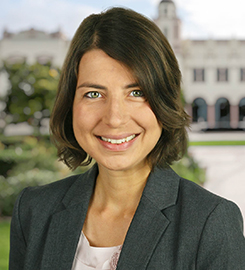By Aliz Nagyvaradi
 I am grateful and humbled for the learning opportunity Shared Hope provided me this summer. It would not be an exaggeration to say that it has been truly impactful experience. Shared Hope has a 20-year history in the anti-trafficking field and its enduring presence makes it a leader in the field.
I am grateful and humbled for the learning opportunity Shared Hope provided me this summer. It would not be an exaggeration to say that it has been truly impactful experience. Shared Hope has a 20-year history in the anti-trafficking field and its enduring presence makes it a leader in the field.
As a Policy and Communications Fellow, I mostly worked with the Center for Justice & Advocacy and the Communications Department on developing the Stop the inJuSTice campaign. This involved delivering the campaign message and sharing information about the non-criminalization of the victims of domestic minor sex trafficking with anti-trafficking stakeholders and the general public.
Shared Hope’s Center for Justice & Advocacy offers the most in depth, accurate and comprehensive legal knowledge and research in the field of domestic minor sex trafficking. Ten weeks were certainly not enough to be able to engage in the full breadth of Shared Hope’s work and research. I am still astonished by the complexity of the issue of child sex trafficking. It has many areas of intervention and details that require a high level of attention and collaboration with various stakeholders from different sectors. Due to the multifaceted character and prevalence of this crime in each and every state in the US, partnership and teamwork, frequent meetings across the country, and online resources are vital to making decisions and changing state laws, so that victims of child sex trafficking have access to trauma-informed services and are not punished for the crimes committed against them.
What I have learned about anti-trafficking work through my fellowship?
- Partnership is crucial. Counter trafficking requires teamwork; one organization alone is not enough to effectively fight sex trafficking.
- Education is key. In order to notice the signs of sex trafficking and to identify victims, we have to learn what to look for. Shared Hope’s awareness and training programs are designed to do that.
- Private sector engagement is important. Companies that are in the travel, tourism, hospitality, or conferencing/meeting sectors can do so much to end the cycle.
- Language counts. Any time we are talking about this issue, such as delivering a campaign message or wording bills, we have to be aware of how language impacts the perception of survivors and the overall fight against trafficking.
- Dedication is also a key. We need to be persistent in our advocacy work and look for allies. Changes do not happen overnight, but through consistent work, we are able to make progress and generate change.
- Collaboration with survivors is essential. We cannot combat human trafficking without including and elevating the voices of survivors.
- A nationwide grassroots movement is a critical element of the anti-trafficking work. Shared Hope International’s volunteer Ambassadors of Hope are able to bring the message and spread awareness about trafficking in their communities, workplaces, and through their networks.
- Everyone can take action. By sharing information about child sex trafficking, talking to your family members and friends, or contacting your legislator as a constituent you can make a difference.
I have also been fortunate to participate in Shared Hope’s JuST Faith Summit in June 2018, which mobilized people of faith to address the issue of domestic minor sex trafficking in their communities. As a staff member, I had the chance to inform the attendees about the Stop the inJuSTice campaign, as well as to attend the plenary sessions and workshops held by dedicated professionals and survivors of sex trafficking. Hearing about the journey of survivors and seeing how their faith helped them, provided an unexpected learning experience for me. I gained courage through their stories. Encountering the dedication and collaboration of stakeholders from Christian-based and survivor-led organizations was more than inspiring—it was truly transformational for me.
Coming from a legal background, I also felt comfortable contributing to the legal research that our policy work requires. While I was researching the online trafficking laws of the 50 states, I learnt a lot about the recent Allow States and Victims to Fight Online Sex Trafficking Act, and the criminal abuse of technology that allows sex trafficking and child online exploitation to grow rapidly.
During my time with Shared Hope, I have recognized parallels and similarities to some of the experiences I have had at the University of San Diego Kroc School of Peace Studies: the power of survivor narratives, the complexity of the issue, and the need for experts to pioneer efforts to eradicate sex trafficking. The courses at the Kroc School helped me develop critical thinking about human rights violations. At the same time, they contributed to my learning on how to address complex social problems and provide solutions to them. At the very beginning of my studies, my faculty advisor suggested that I think strategically when choosing my internship placement for the summer. I am glad that I took his advice. I only applied for internship positions which fell into my area of interest and required the skills and background that I could put in practice, but could still provide me with challenges and exciting opportunities to improve professionally. The work I was involved in at Shared Hope International was the perfect match for me.
Certainly, my fellowship with Shared Hope has been one of the most valuable experience I have had in the US so far, both personally and professionally. My faith has become stronger, which helps me in pursuing a meaningful career, one that has an impact on lives. I am equipped with all of the tools and resources that I need to become an effective anti-trafficking advocate. I have also become an official volunteer Ambassador of Hope, and am looking forward to working on Shared Hope’s projects in the future.
 Serving since 1980, Congressman Smith was a lone voice breaking the silence on the topic of human trafficking at a time when most people had no idea the atrocity was occurring. He was the author and primary sponsor of the Trafficking Victims Protection Act of 2000 (TVPA), which first clearly defined domestic trafficking, and has been steadfast in promoting its reauthorization over multiple years since that original landmark legislation, working across the aisle to ensure protections for victims of human trafficking. In leading the reauthorization efforts this year, Congressman Smith worked diligently to not just pass the law, but improve it. Through his dedication to understanding all facets of trafficking, he is ensuring the TVPA remains responsive to the changing dynamics of trafficking.
Serving since 1980, Congressman Smith was a lone voice breaking the silence on the topic of human trafficking at a time when most people had no idea the atrocity was occurring. He was the author and primary sponsor of the Trafficking Victims Protection Act of 2000 (TVPA), which first clearly defined domestic trafficking, and has been steadfast in promoting its reauthorization over multiple years since that original landmark legislation, working across the aisle to ensure protections for victims of human trafficking. In leading the reauthorization efforts this year, Congressman Smith worked diligently to not just pass the law, but improve it. Through his dedication to understanding all facets of trafficking, he is ensuring the TVPA remains responsive to the changing dynamics of trafficking.





